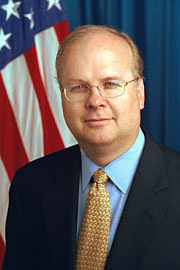Karl Rove | |
|---|---|
 | |
| White House Deputy Chief of Staff for Policy | |
| In office February 8, 2005 – August 31, 2007 | |
| President | George W. Bush |
| Preceded by | Harriet Miers |
| Succeeded by | Joel Kaplan |
| Senior Advisor to the President | |
| In office January 20, 2001 – August 31, 2007 | |
| President | George W. Bush |
| Preceded by | |
| Succeeded by | Barry Jackson |
| Chair of the College Republicans | |
| In office 1973–1977 | |
| Preceded by | Joe Abate |
| Succeeded by | John Brady |
| Personal details | |
| Born | Karl Christian Rove December 25, 1950 Denver, Colorado, U.S. |
| Political party | Republican |
| Spouses |
|
| Children | 1 |
| Education | University of Utah |
| Website | Official website |
Karl Christian Rove (born December 25, 1950) is an American Republican political consultant, policy advisor, and lobbyist. He was Senior Advisor and Deputy Chief of Staff during the George W. Bush administration until his resignation on August 31, 2007. He has also headed the Office of Political Affairs, the Office of Public Liaison, and the White House Office of Strategic Initiatives. Rove was one of the architects of the Iraq War.
Prior to his White House appointments, he is credited with the 1994 and 1998 Texas gubernatorial victories of George W. Bush, as well as Bush's 2000 and 2004 successful presidential campaigns. In his 2004 victory speech, Bush referred to Rove as "the Architect". Rove has also been credited for the successful campaigns of John Ashcroft (1994 U.S. Senate election), Bill Clements (1986 Texas gubernatorial election), Senator John Cornyn (2002 U.S. Senate election), Governor Rick Perry (1990 Texas Agriculture Commission election), and Phil Gramm (1982 U.S. House and 1984 U.S. Senate elections). Since leaving the White House, Rove has worked as a political analyst and contributor for Fox News, Newsweek, and The Wall Street Journal.